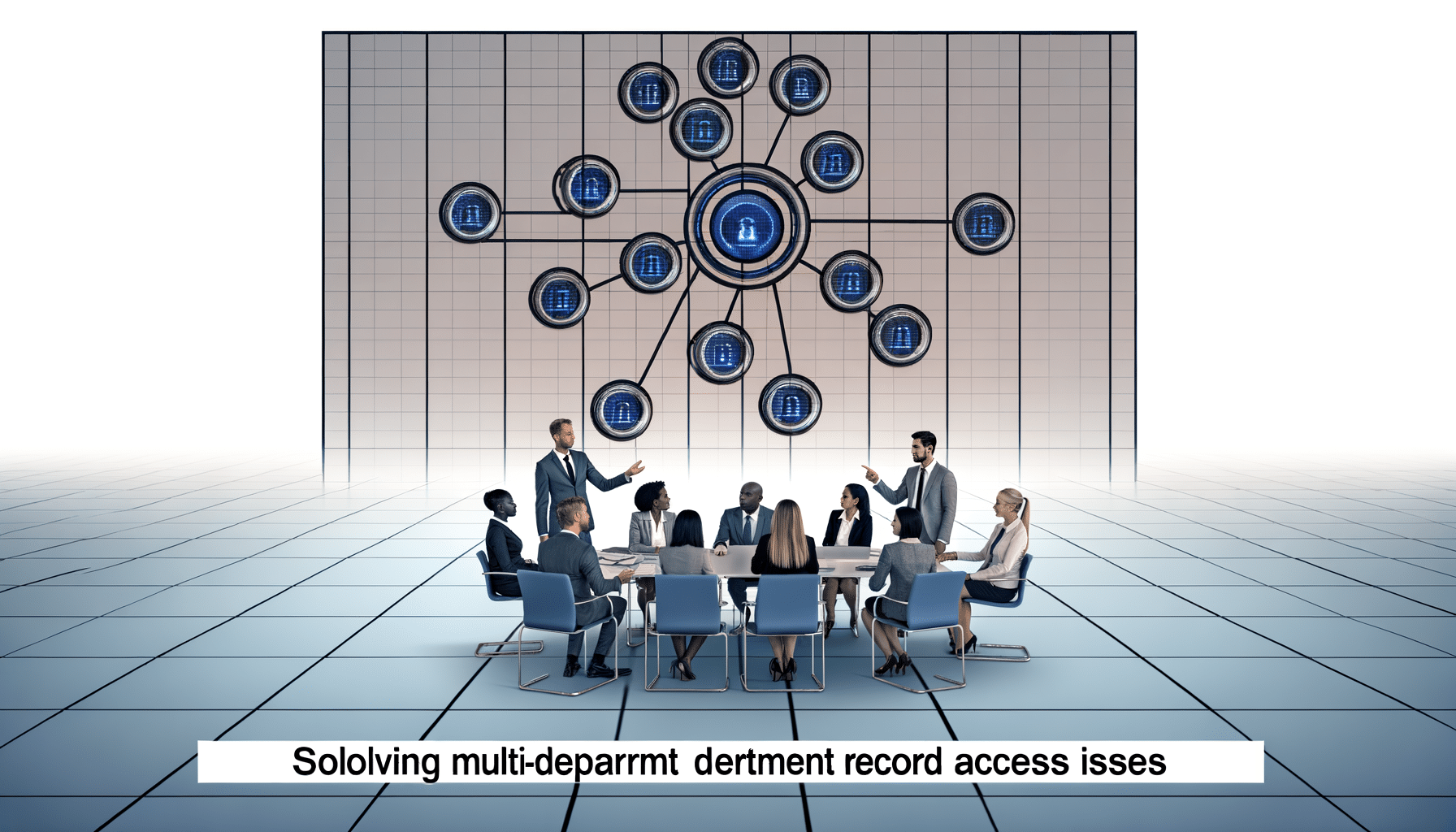- Archive Security
- November 16, 2024
Solving Multi-Department Record Access Issues

In today’s fast-paced and increasingly digital world, managing records across various departments in an organization can be a labyrinthine challenge. Information is a vital asset, yet streamlining record access and ensuring that the right people in the right departments have the correct access can be perplexing. The consequences of mishandling records can be severe, ranging from data breaches to compliance violations. As someone deeply involved in the tech landscape, I’ve observed that the complexities of record access can be unravelled efficiently using cutting-edge solutions like those offered by RecordsKeeper.AI.
The Challenge of Multi-Departmental Record Access
Navigating the myriad of record access issues that organizations face is no small feat. Whether it’s the Legal, Finance, or Compliance departments, each has unique needs, responsibilities, and sensitive information. The challenge lies in ensuring that each department has access to the records relevant to its operations while preventing unauthorized access. A mishap here can lead to grievous security breaches.
One recurrent issue I’ve encountered in my journey is the difficulty in managing access in a way that scales with company growth. As organizations expand, the number of records multiplies, so does the requirement for precise access controls. Businesses are often left grappling with a system unnecessarily convoluted, compromising both security and efficiency.
Navigating Access Complexity With Blockchain-Based Security
The solution lies in adopting a robust system that doesn’t just manage but also anticipates these complexities. This is where our platform, RecordsKeeper.AI, steps in as a game-changer. With blockchain-based security, we provide a means of ensuring that record integrity remains intact and records are tamper-proof. The immutable nature of blockchain guarantees that any changes, authorized or unauthorized, can be traced.
By leveraging blockchain, departments can experience a seamless process that enhances transparency and reduces the bottlenecks traditionally associated with verifying and granting access. It’s a vital shift from seeing record management as mere backend logistics to viewing it as an integral part of the strategic fabric that ensures security and fosters trust.
Automated Access Controls for Enhanced Efficiency
Harnessing automation is another revolutionary step in tackling the pain of departmental record access issues. With the AI-powered tools on our platform, records are automatically classified and tagged, allowing departments to retrieve necessary documents through simple, natural language queries. The need for manual oversight decreases significantly, minimizing both human error and the time taken in typically tedious processes.
Additionally, RecordsKeeper.AI supports secure data rooms. These digital vaults ensure that sensitive files are accessed and shared with stringent access controls and real-time activity tracking, fortifying both security and operational efficiency within departments.
Ensuring Compliance Across Departments
The modern regulatory environment demands meticulous compliance, and this becomes more complex with every record that any department needs to handle. RecordsKeeper.AI is designed to automate regulatory workflows, ensuring that departments adhere to industry standards such as GDPR, HIPAA, and SOX automatically. By letting technology handle these aspects, companies can lower the risk of compliance breaches and free their staff to focus on core strategic activities.
Strengthening Internal Collaboration
An often overlooked aspect of efficient record access management is its impact on internal collaboration. When departments can seamlessly access the necessary information, it enhances collaboration, leading to quicker decision-making and more informed strategies. The internal synergy bolstered by accurate record access can be transformative, driving both productivity and innovation.
Conclusion: Embracing a Future-Ready Solution
Solving multi-department record access issues isn’t just about improving logistics. It’s about safeguarding information, streamlining workflows, and empowering departments to better perform their roles. At RecordsKeeper.AI, we offer the tools to transform record management from a mundane task into a strategic advantage. As I continue on this entrepreneurial journey, I invite you to explore the possibilities that our platform opens up. Let’s make record access a strength, not a vulnerability, and step boldly into a future of assured security and compliance. Join me on this path, and let’s harness technology to drive not just individual departmental success but holistic organizational growth.
Toshendra Sharma is the visionary founder and CEO of RecordsKeeper.AI, spearheading the fusion of AI and blockchain to redefine enterprise record management. With a groundbreaking approach to solving complex business challenges, Toshendra combines deep expertise in blockchain and artificial intelligence with an acute understanding of enterprise compliance and security needs.
Related Posts

Handling Sensitive Records in Open Offices
Maintaining confidentiality in open workspace layouts.
- December 9, 2024

Managing Records in Shared Office Spaces
Keeping records secure in coworking and shared environments.
- November 23, 2024
Archives
- December 2024
- November 2024
- October 2024
- September 2024
- August 2024
- July 2024
- June 2024
- May 2024
- April 2024
- March 2024
- February 2024
- January 2024
- December 2023
- November 2023
- October 2023
- September 2023
- August 2023
- July 2023
- June 2023
- May 2023
- April 2023
- March 2023
- February 2023
- January 2023
- December 2022
- November 2022
- October 2022
- September 2022
- March 2019
Want to get more content like this?
Signup to directly get this type of content to your inbox!!
Latest Post
Organizing External Auditor Access
- December 22, 2024
Document Control in Manufacturing Plants
- December 21, 2024
Handling Rush Financial Report Requests
- December 20, 2024
Managing Record Access After Staff Changes
- December 19, 2024





